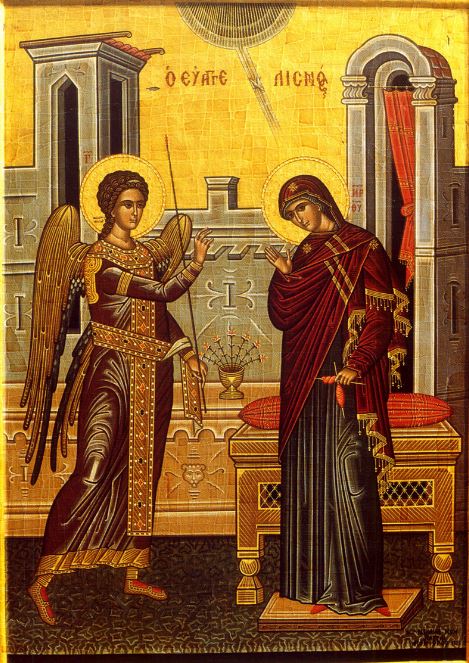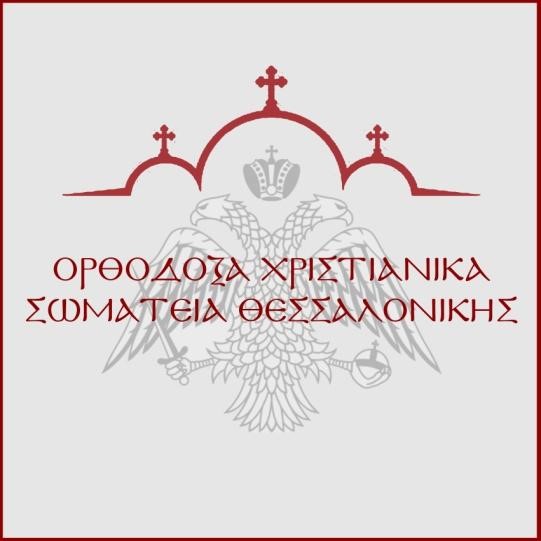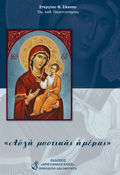 ΑΠΟΛΥΤΡΩΣΙΣ
ΧΡΙΣΤΙΑΝΙΚΗ ΟΡΘΟΔΟΞΗ ΑΔΕΛΦΟΤΗΣ
ΑΠΟΛΥΤΡΩΣΙΣ
ΧΡΙΣΤΙΑΝΙΚΗ ΟΡΘΟΔΟΞΗ ΑΔΕΛΦΟΤΗΣ
c) The Annunciation of the Virgin Mary (Lk 1:26-38)
Translation from the book:
Στεργίου Ν. Σάκκου, Ἑρμηνεία στό κατά Λουκᾶν Εὐαγγέλιο, τόμ. Α΄,
ἐκδ. «ΧΡΙΣΤΙΑΝΙΚΗ ΕΛΠΙΣ» ΟΡΘΟΔΟΞΗ ΑΔΕΛΦΟΤΗΤΑ, Θεσ/νίκη 2008, σσ. 47-62
(Stergios N. Sakkos [Read CV], A Commentary on the Gospel according to St. Luke, vol. A', pp. 47-62)
In this passage 1:26-38 Luke describes with great simplicity, strong emphasis and undeniable historical credibility the Annunciation of the Virgin Mary. It is the event which marks the beginning of the fulfilment of the salvation plan as we chant in the Apolyticion of this feast: "Today is the beginning and most important opening event of our salvation and the revelation of the eternal mystery, the Son of God becomes the Son of the Virgin and this grace is evangelized by Gabriel proclaims grace ...". This divine plan, "which was kept secret since the world began" (Ro 16:25), is revealed in the event of the Annunciation.
The infinite and immortal God wishes to unite his life and history with the life and history of the finite and mortal men. He who, through the creation of nature, has already manifested his presence and omnipotence (cf. Ro 1:19-20), unites his divine nature with men’s nature. He comes to visit our earth as a Godman, so that he may draw closer to us and we may approach him more closely. In this course of his encounter with us, while the inconceivable magnitude of his love and the unfathomable depth of his humility are revealed, we distinguish twelve extremely important milestones, beginning with the event of the Annunciation.
The Church has defined twelve feasts concerning the Lord corresponding to the stations of the divine economy: Annunciation, Christmas, Circumcision, The Dedication of Jesus (a jewish tradition where the firstborn was brought 40 days after its birth to the temple to be blessed), Baptism, Transfiguration, Entrance into Jerusalem, Last Supper, Passion, Descent into Hades, Resurrection, Ascension, Pentecost. By these celebrations we experience through the sacraments up to today, all that was prophesied for our salvation in the Old Testament and fulfilled in the New Testament. The promises of the Old Testament, which are historical events of the New Testament, become our personal experience. Our faith is thus established on an amazing solid tripod -prophecy, history, experience- which is not found in any other religion or philosophy.
1,26. Ἐν δὲ τῷ μηνὶ τῷ ἕκτῳ ἀπεστάλη ὁ ἄγγελος Γαβριὴλ ὑπὸ τοῦ Θεοῦ εἰς πόλιν τῆς Γαλιλαίας, ᾗ ὄνομα Ναζαρέτ.
1:26 In the sixth month of Elizabeth’s pregnancy, God sent the angel Gabriel to Nazareth, a town in Galilee.
Six months after his appearance to Zechariah, Gabriel was sent by God to the virgin Mary, who lived in Nazareth of Galilee. This definition of time allows us to define the difference in age between Jesus Christ and John the Baptist.
Nazareth was a small town in southern Galilee, approximately 140 km north of Jerusalem. Some interpreters question its existence because it is not mentioned in the Old Testament. But the Old Testament is neither a geographical dictionary nor a postal directory of Palestine. It would certainly be foolish to claim that there were no cities in ancient Greece other than those mentioned by Thucydides.
Nazareth in general was a notorious area. Nathanael's objection is characteristic, when Philip spoke to him enthusiastically about Jesus "of Nazareth", "Can any good thing come out of Nazareth?" (Jn 1:45-47).
1,27. πρὸς παρθένον μεμνηστευμένην ἀνδρί, ᾧ ὄνομα Ἰωσήφ, ἐξ οἴκου Δαυΐδ, καὶ τὸ ὄνομα τῆς παρθένου Μαριάμ.
1:27 to a virgin engaged to a man named Joseph, a descendant of David. The virgin’s name was Mary.
The virgin Mary was engaged, betrothed to Joseph. The duration of the engagement in the Old Testament was not defined. However, because there was no marriage ceremony, from the time of the engagement the young girl belonged to her fiancé. An engagement did not mean a mere promise of marriage, but the perfect legal contract of marriage. Joseph was a man of prudence and self-control, an exceptional person whom God chose to entrust with the custody of His Son’s mother. He was not a man of carnal disposition, that is why he did not immediately make his fiancée his wife. This is attested by his dilemma, when he perceived her pregnancy: should he deliver Mary to be stoned to death, as the Mosaic law prescribed (cf. Deut 22:23-24), or "to divorce her quietly" (Mt 1:19), as his nobility of feelings and morality dictated? Only after God's revelation that “who is conceived in her is of the Holy Ghost" (Mt 1:20), he calmed down and, at the angel's command, kept the Virgin, the Most Holy Mother, close to him.
God devised this wise plan for Mary to be engaged to Joseph, because for the Jews it was unthinkable for an unmarried woman to give birth to a child. In the eyes of the people Jesus appeared to be Joseph’s and Mary’s son (cf. Lk 3:23). Only the two of them and Elizabeth knew the secret of Jesus' conception, which should not be revealed, lest the Virgin would be considered an adulteress and the conception by the Holy Spirit would be known to the devil. St. Ignatius writes that three things escaped Satan’s attention: "And the ruler of this age did not understand, the virginity of Mary, her giving birth, and likewise the death of the Lord, three obvious mysteries that took place in the silence of God".
Joseph (see Lk 2:4) and the virgin Mary descended from David’s lineage and house. As a rule, as already mentioned (see comments on v. 5), every Israelite married a woman from his own tribe and usually from his own generation. The prophet Isaiah had already prophesied that the virgin Mary came from David’s lineage. He had said that the Messiah would come "from the root of Jesse" (11:1).
Elizabeth, although she came "from the daughters of Aaron" (v. 5), was a relative of the virgin Mary. Apparently, her mother was of David’s lineage, while her father was of Levi’s lineage.
The Hebrew name Mariam is often found in the Old Testament and had been given many interpretations: 'powerful', 'worshipful and praiseworthy', 'sea-born'. The first two are the most likely.
1,28. Καὶ εἰσελθὼν ὁ ἄγγελος πρὸς αὐτὴν εἶπε· χαῖρε, κεχαριτωμένη· ὁ Κύριος μετὰ σοῦ· εὐλογημένη σὺ ἐν γυναιξίν.
1:28 The angel went to her and said, “Rejoice, you who are highly favored! The Lord is with you; blessed are you among women”.

The address “highly favored” which is explained by the angel himself -"you have found favor with God" (v. 30)- indicates that the Virgin, although as a human being she is not sinless, but she, too, is burdened with original sin, she also has the grace, the favor of God, she is flooded, saturated with divine grace. She is full of light, mercy, love, joy, peace, goodness, holiness, of all God’s blessings and gifts generally. But she also has the supreme favor to conceive God’s Son. This makes her sinless. Her grace remains inexhaustible, because she has with her the source of grace, God Himself, as the angelic word testified “The Lord is with you”.
At the hour of the Annunciation, the humble daughter of Nazareth received God’s supreme blessing and proved to be blessed among women. This greeting becomes a characteristic of the Virgin's identity. This is how the spirit-motivated Elizabeth addressed her (cf. 1:42). She is the most blessed of all women, the most elect among all mankind. The "fullness of the time" (Ga 4:4), the suitable time for God to fulfill the promise of salvation, which he gave to Adam and Eve after their fall, the so-called first gospel (cf. Ge 3:15), had now arrived. It was then that sin yielded its most rotten fruit, an impoverished dying humanity, that "had knelt, was bent over, unable to stand and could not fully straighten herself" (Lk 13:11), but just then grace also brought forth its most mature and perfect fruit, a humble and pure Virgin, the highly favored.
1,29. Ἡ δὲ ἰδοῦσα διεταράχθη ἐπὶ τῷ λόγῳ αὐτοῦ, καὶ διελογίζετο ποταπὸς εἴη ὁ ἀσπασμὸς οὗτος.
1:29 Mary was greatly troubled at his words and wondered what kind of greeting this might be.
From this passage which narrates the Annunciation and from the one that follows next (see v. 39-56), presenting the meeting of the Lord’s Mother with Elizabeth, we derive a wealth of authentic information about the personality of the virgin Mary. The evangelist Luke depicts her portrait with vividness and grace, which shows not only her purity but also her prudence, deep humility and genuine faith. The virgin Mary was an intelligent and graceful young girl. When she heard the message of the Annunciation from the angel, she was not overwhelmed by the great honor, nor did she believe thoughtlessly in the heavenly announcement. She did not hasten to apply to herself the prophecies she knew about the Messiah, namely, that he would be born of a virgin (cf. Ge 3:15; Is 7:14, etc.). Her reaction revealed a person from whom any egoism or morbidity in religious issues was absent.
Mary was “greatly troubled”, very upset by the unexpected appearance and the angel’s greeting. She wondered “what kind of greeting this might be”, what this greeting meant. The prudent Virgin stands hesitantly before the angel, in contrast to Eve, who unreservedly accepted the evil’s proposal when he approached her in paradise (cf. Ge 3:1-7). Restrained and modest, Mary inquired into the words of praise she heard from the angelic mouth.
Zigavinos writes: “She feared that the words might be deceptive". She thought that it was possible that the deceitful devil had transformed himself into an angel of light and was setting a trap for her (cf. 2 Cor 11:14).
1,30. Καὶ εἶπεν ὁ ἄγγελος αὐτῇ· μὴ φοβοῦ, Μαριάμ· εὗρες γὰρ χάριν παρὰ τῷ Θεῷ.
1:30 But the angel said to her, “Do not be afraid, Mary; you have found favor with God.
The angel sensed the Virgin’s inner anxiety. By “Do not be afraid”, he soothed her agitation and, as God's representative, gave her peace. Then he answered her speculation with his revelation; “you have found favor with God”. He explained his greeting “highly favored” by telling her that she had received grace from God, she had won his favor and his special love.
1,31. Καὶ ἰδοὺ συλλήψῃ ἐν γαστρὶ καὶ τέξῃ υἱόν, καὶ καλέσεις τὸ ὄνομα αὐτοῦ Ἰησοῦν.
1:31 You will conceive and give birth to a son, and you are to call him Jesus.
The angel clearly announced to the Virgin the message he was proclaiming: “You will conceive and give birth to a son, and you are to call him Jesus”. The paradox in this message is that a virgin will give birth, because "childbearing is unknown to virgins", as the Church chants on the Nativity of the virgin Mary. With this child’s birth, the prophecy of Isaiah would be fulfilled: "Behold, a virgin shall conceive, and bear a son, and shall call his name Immanuel" (7:14).
The Hebrew name Jesus, Yeshua, means "Yahweh saves". Many persons had this name in the Old Testament. But in the case of Jesus Christ, as the angel revealed to Joseph, it means "for he shall save his people from their sins" (Mt 1:21). Jesus, the son of the Virgin, is the God savior, the very Yahweh who will save his people from sin.
1,32-33. Οὗτος ἔσται μέγας καὶ υἱὸς ὑψίστου κληθήσεται, καὶ δώσει αὐτῷ Κύριος ὁ Θεὸς τὸν θρόνον Δαυῒδ τοῦ πατρὸς αὐτοῦ, καὶ βασιλεύσει ἐπὶ τὸν οἶκον Ἰακὼβ εἰς τοὺς αἰῶνας, καὶ τῆς βασιλείας αὐτοῦ οὐκ ἔσται τέλος.
1:32-33 He will be great and will be called the Son of the Most High. The Lord God will give him the throne of his father David, and he will reign over Jacob’s descendants forever; his kingdom will never end.
Jesus who will be born by Mary, will be the Messiah expected from David’s lineage. The angel's message summed up all the prophecies of the Old Testament concerning the coming of the Messiah and the establishment of his eternal spiritual kingdom.
John the Baptist may well be called great (cf. v. 15), but certainly only Jesus Christ is absolutely and undoubtedly great.
Jesus was from the beginning of his incarnation the Son and Word of God. He “will be called the Son of the Most High” (cf. Ps 2:7) means that men would recognize his divinity by the signs he would accomplish and call him the Son of God (cf. Ro 1:4). The voice of God the Father, heard at Jesus’ baptism, was also revealing; "this is my beloved Son, with whom I am well pleased" (Mt 3:17).
One main characteristic of the Messiah is that he will reign eternally on the throne of his father David, from whose lineage he descends as a human being (cf. 2 Sam 7:12-14). 16; Ps 131:11; Is 9:7); “and the Lord God shall give him the throne of David his father, and he shall reign over the house of Jacob forever and there shall be no end of his kingdom”. The message was clear that was given to the Wise Men who inquired in Herod's palace where the king of the Jews was born; "in Bethlehem of Judea" (Mt 2:5), where David came from (cf. Mic 5:1).
“Jacob’s descendants” were all those who would believe in Jesus Christ and would form God’s new people, the Church. This is the Messiah’s eternal and endless kingdom.
1,34. Εἶπε δὲ Μαριὰμ πρὸς τὸν ἄγγελον· πῶς ἔσται μοι τοῦτο, ἐπεὶ ἄνδρα οὐ γινώσκω;
1:34 “How will this be,” Mary asked the angel, “since I am a virgin?”
Mary didn’t receive the angelic message without hesitation. She did not doubt, of course, that it would come true, but she wanted to know how, raising a serious objection “How will this be, since I am a virgin?”
The expression "ἐπεὶ ἄνδρα οὐ γινώσκω;" means “I have no conjugal relations”. The present tense of the verb indicates an intention of lifelong virginity. The expression “οὐ γινώσκω”, “I have no conjugal relations”, does not only refer to the period up to the time of Annunciation -the Virgin's objection would not make sense then- but also embraces the future. Just as the one who has decided never to drink wine in his life and expresses himself in the present tense by saying "I do not drink"; just as the non-smoker says "I do not smoke", meaning that he does not intend to smoke in the future either, so the Virgin uses the so-called "βουλητικός" present tense, indicating her firm will to abstain completely from conjugal relations.
Of course, Mary knew the prophecy of Isaiah; "Behold, a virgin shall conceive, and bear a son, and shall call his name Immanuel" (7:14). However, it never crossed her mind the suspicion that the prophet was referring to her. Her deep humility did not allow such a thought even after all those the heavenly messenger revealed to her (cf. vv. 30-33). The feeling that prevailed within her and spontaneously manifested was her anxiety lest her secret marriage with the Lord, her sacred vow, should be dissolved; lest she should lose what she had accepted from childhood as a calling from God and to which she responded with all her being, with a wondrous vocation.
Interpreting this passage, St. Augustine observes: "She would not have said this if she had not made a vow to God beforehand to remain a virgin". And in a sermon attributed to St. Gregory of Nyssa also points out that because Mary had an inclination towards virginity, she neither disbelieved the angel nor departed from her secret decision. Her question “How will this be since I am a virgin?”, reveals what she was hiding in herself. And this thought is proved as follows: If Joseph had the intention to make the Virgin his wife, it would not be natural for her to be surprised, when it was foretold that she would give birth, since she herself would expect to become a mother, according to the law of nature. St. Gregory of Nyssa says: "But because her flesh, which was consecrated to God, was to be preserved intact, therefore, she says, although you are an angel and have come down from heaven and your appearance is something supernatural, yet it is impossible for me to have conjugal relations. So how can I be a mother without a husband? For I recognize Joseph as a fiancé, but not as a husband".
Virgin Mary, apparently, in order to secure her secret holy vow, she was engaged to Joseph, who was already middle-aged and after the death of his wife he was responsible of his children. It seems that they agreed to have a peculiar marriage, free of conjugal relations; she would help him in the upbringing of his children and he, appearing to the world as her husband, would provide the social protection necessary to maintain her virginity. For the decision for lifelong virginity was totally alien to Jewish morals, incomprehensible and provocative for that time.
In the Old Testament, after Abel was killed and did not manage to get married, only three men are mentioned as virgins, Elijah, Elisha and Jeremiah. No woman seems to had chosen the virgin life. The modest girl of Nazareth was the first to love God so much that she desired to consecrate her virginity to him. And her desire was so strong that it remained irrevocable even after the angel's amazing prophecy. Thus, indeed, it was fitting for the most excellent soul known to the ages; for the one who rose to the highest dignity of becoming God’s mother; for the ever-blessed Mary, who was rightly described as "the good carer" of virgins.
1,35. Καὶ ἀποκριθεὶς ὁ ἄγγελος εἶπεν αὐτῇ· Πνεῦμα Ἅγιον ἐπελεύσεται ἐπὶ σὲ καὶ Δύναμις ῾Υψίστου ἐπισκιάσει σοι· διὸ καὶ τὸ γεννώμενον ἅγιον κληθήσεται υἱὸς Θεοῦ.
1:35 The angel answered, “The Holy Spirit will come on you, and the power of the Most High will overshadow you. So the holy one to be born will be called the Son of God.
Without difficulty the angel answered Mary's question. He did not rebuke her, like he did with Zechariah. Her reaction was perfectly justified, for there had been no similar incident in the past. No child was ever born to a virgin woman.
The angel, therefore, explained to her that she would be visited by God Himself and would be overshadowed, just as the bright cloud overshadowed the tabernacle-Tent of Testimony, indicating the power and presence of God (see Ex 40:28-32). Jesus’ conception would take place at the descent of the Holy Spirit.
In this verse the three persons of the Holy Trinity appear. The designation "Most High" is attributed to the Father and the Power that would overshadow the Virgin was the Son. The Holy Spirit is also clearly mentioned. Just as at the creation of the world, according to the proclamation of St. Athanasius, "the Father through the Word in the Holy Spirit acts in everything", so now the Father through the Son in the Holy Spirit founded the new creation, the Church, in which the rebirth of man took place. And in this work the Triune God used the virgin Mary as his first and best collaborator.
The child that the virgin Mary would bring into the world is called “holy” in an absolute sense, because it is the only child born free from original sin.
The Son of God, the second person of the Holy Trinity, was incarnated in the Virgin’s womb. How did exactly this happen? A mystery! All we know is that it happened with the descent of the Holy Spirit. Even the servant of this mystery, Gabriel, and the God-inspired historians who recorded the event could say nothing else, except that it was done by the Spirit. How and in what way, no one explained; "it was not possible", declared St. Chrysostom categorically.
The heretical Nestorians maintained that Mary gave birth to the man Christ and that the deity came to dwell within him later. But this passage confirms their error. The deity was of course covered through the incarnation, but it never ceased to exist even for a moment. Jesus "is human in appearance yet God in concealment", according to the apt wording of George Acropolitos. Our Most Holy Lady is therefore, rightly called Theotokos, Mother of God, and not Christotokos, Mother of Christ, as the heresiarch Nestorius claimed.
The modest girl of Nazareth succeeded in experiencing the sublime divine communion. She gave to God her human nature (cf. Heb 2:14), so that God might become the God-man, and God granted her divinity, so that she might become the first human-god. It is on this theological basis that the honour, which the Orthodox Church attributes to her, is based. It does not deify her, as the Catholics do, nor does it belittle her, as the Protestants do; it honours her, inspired by the way God Himself has honoured her.
The devil, taking advantage of man's desire for “theosis” = partaking in the divine nature -which was inherent, since he was created "in the image and likeness" of God (Ge 1:26)-promised him deification (cf. Ge 3:5) and led him to destruction. But through the incarnation of God the surest and perfect way for man's theosis was opened. The Virgin Mary was the first to walk in it. All those who, taking her as a model, strive to live in submission to the will of God, all the human beings who are "participants of the divine nature" follow (2 Pt 1:4).
The Annunciation which the virgin Mary experienced as a historical event is something that every believer is called to live in his spiritual life. Just as she conceived and gave birth to Jesus Christ by the Holy Spirit, so too the Christian who has communion with the Holy Spirit is called to conceive and bring into the world a little Christ, his Christified self, a true copy of the archetype-prototype.
1,36. Καὶ ἰδοὺ Ἐλισάβετ ἡ συγγενής σου καὶ αὐτὴ συνειληφυῖα υἱὸν ἐν γήρει αὐτῆς, καὶ οὗτος μὴν ἕκτος ἐστὶν αὐτῇ τῇ καλουμένῃ στείρᾳ.
1:36 Even Elizabeth your relative is going to have a child in her old age, and she who was said to be unable to conceive is in her sixth month.
Because Mary did not show disbelief to the angel's words, he strengthened her faith by telling her of a miraculous incident of supernatural birth. The angel did not refer to the examples of Sarah and Rebekah, which were in the past. He informed her of a similar event of her day, the truth of which she could ascertain for herself. It is Elizabeth's pregnancy, which had not yet become known to men (see p. 24). In order to strengthen her faith in the omnipotence of God, Elizabeth's age and sterility are emphasized and details of the time of the conception and the sex of the child are revealed to Mary.
1,37. ὅτι οὐκ ἀδυνατήσει παρὰ τῷ Θεῷ πᾶν ῥῆμα.
1:37 For no word from God will ever fail.
The paradoxes announced by the angel would be accomplished by the power of God. Nothing is impossible to Almighty God (cf. Job 42:2). Mary, who believed in the all-powerful Lord, was assured that what the angel announced to her would be fulfilled.
1,38. Εἶπε δὲ Μαριάμ· ἰδοὺ ἡ δούλη Κυρίου· γένοιτό μοι κατὰ τὸ ῥῆμά σου. Καὶ ἀπῆλθεν ἀπ᾿ αὐτῆς ὁ ἄγγελος.
1:38 “I am the Lord’s servant,” Mary answered. “May your word to me be fulfilled”. Then the angel left her.
God was waiting for Mary's answer. He asked for the free consent of Ηis servant, as the bridegroom waits for the answer of the bride-to-be. The Virgin freely, responsibly and voluntarily agreed to cooperate in the fulfillment of the plan of the divine providence; “I am the Lord’s servant” she humbly said and became a god-bride. She believed that what had been said would come true and entrusted herself completely in God’s hands. She accepted "what was said", the will of God revealed to her, and did not search for all those that heaven had kept "in silence". To the Lord’s nod she willingly surrendered without resistance, just like clay in the potter’s hands. For this deep humility that raised the girl of Nazareth to the heavens, the teacher of our nation Elias Miniatis exclaimed: "O wondrous power of a Virgin, who with “May your word to me be fulfilled” made God change the stars with the earth!".
The word “may” expresses a wish. St. Nicholas Cavassila commented on this: "May, the Virgin wishes and immediately Jesus was incarnated in her" and continued: "During the time the Virgin asked to know the way in which the pregnancy would take place, God was not descending. At the moment she was convinced and accepted the call, the whole work was accomplished at once: God took upon Him as a garment the human form and the Virgin became the mother of the Creator... In this way the incarnation of the Word was the work not only of the Father who "was pleased" and of his Power who "overshadowed" and of the Spirit who "descended", but also of the Virgin's will and faith."
It is remarkable, finally, that the Virgin did not say "according to the word of the Lord", but “according to your word”. At that moment she saw the Lord present in the presence of the angel. The angel present was the administrator of the divine plan.
Copyright © 2021 by Orthodox Christian Association «ΧΡΙΣΤΙΑΝΙΚΗ ΕΛΠΙΣ» ΟΡΘΟΔΟΞΗ ΑΔΕΛΦΟΤΗΤΑ. Used by permission. All rights reserved.








